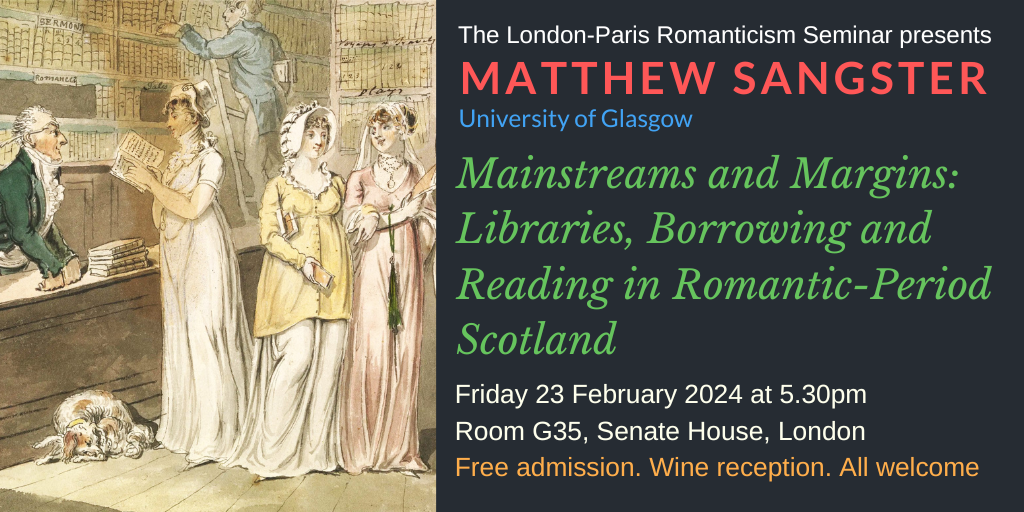
The next meeting of the London-Paris Romanticism Seminar will take place on Friday 23 February 2024 in the Bloomsbury Room (G35, ground floor), Senate House, University of London, starting at 5.30 pm. As our distinguished guest speaker, we are delighted to welcome Professor Matthew Sangster of the University of Glasgow, who will deliver a paper entitled Mainstreams and Margins: Libraries, Borrowing and Reading in Romantic-Period Scotland. This will be followed by a discussion and wine reception. The seminar will be chaired by Gregory Dart.
The event is free and open to everyone, including postgraduates and members of the public. No booking is required.
Matthew Sangster is Professor of Romantic Studies, Fantasy and Cultural History at the University of Glasgow. He is the author of Living as an Author in the Romantic Period (2021) and An Introduction to Fantasy (2023) and editor of Institutions of Literature, 1700-1900 (with Jon Mee, 2022), Remediating the 1820s (with Jon Mee, 2023), Realms of Imagination: Essays from the Wide Worlds of Fantasy (with Tanya Kirk, 2023) and David Bowie and the Legacies of Romanticism (2023). He was external curator of the current British Library exhibition Fantasy: Realms of Imagination (to 25 February 2024, then touring) and is co-investigator on the AHRC–funded projects ‘Libraries, Reading Communities and Cultural Formation in the Eighteenth-Century Atlantic’ (led by Mark Towsey at the University of Liverpool) and ‘Books and Borrowing, 1750-1830: An Analysis of Scottish Borrowers’ Registers’ (with Katie Halsey and a cross-institutional team based at Stirling and Glasgow). He is lead organiser for the British Association for Romantic Studies 2024 international conference, ‘Romantic Making and Unmaking’ (University of Glasgow, 23-25 July; Online: 1-2 August).
Regarding the topic of his paper, Matthew writes:
“Cultural histories often privilege the accounts of elite figures when attempting to characterise an age’s zeitgeist, taking quite specific pronouncements and reading practices as representative. By exploring the extensive records and collections of Scottish institutions, this paper will provide a counterpoint to the individualistic models of Romantic reading propagated by canonical poets and essayists. I will first examine evidence collected by the ‘Books and Borrowing, 1750-1830′ project, tracing the nuances of different Scottish reading communities as inferred from the surviving loans registers of institutions including the Advocates Library, Chambers’ Circulating Library, the library of the Royal High School, the Selkirk Subscription Library and the Westerkirk Library. Examining these records indicates that many of the works now seen as the major achievements of the Romantic period were relatively marginal in the eyes of contemporary readers and that reading trends were often local, context-specific and temporally various. I will then turn to Romantic-period marginalia drawn from the libraries of the universities of Glasgow and St Andrews, considering how the forms of boisterous social reading evident in institutional collections might serve to broaden our conceptions of how and why Romantic-period readers engaged with books.”